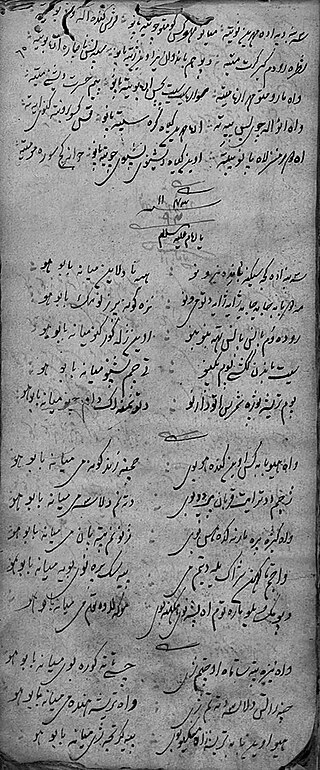Literature of Kashmir has a long history, the oldest texts having been composed in the Sanskrit language. Early names include Patanjali, the author of the Mahābhāṣya commentary on Pāṇini's grammar, suggested by some to have been the same to write the Hindu treatise known as the Yogasutra, and Dridhbala, who revised the Charaka Samhita of Ayurveda.
Mirza is a name of Persian origin. It is used as a surname or prefix to identify patriarchal lineage. It is derived from the term Mirzadeh.
Ahmad Alaq was the Khan of Eastern Moghulistan from 1487 to 1504. He was the second son of Yunus Khan. His mother was Shah Begum, fourth daughter of Badakhshan prince Lali.
The History of India, as Told by Its Own Historians is a book comprising translations of medieval Persian chronicles based on the work of Henry Miers Elliot. It was originally published as a set of eight volumes between 1867–1877 in London. The translations were in part overseen by Elliot, whose efforts were then extended and edited posthumously by John Dowson.

Yunus Khan, was Khan of Moghulistan from 1462 until his death in 1487. He is identified by many historians with Ḥājjī `Ali, of the contemporary Chinese records. He was the maternal grandfather of Babur, founder of the Mughal Empire.
Sindhi literature is the collection of oral and written literature in the Sindhi language in prose and poetry. The Sindhi language of the province of Sindh in Pakistan is considered one of the oldest languages of ancient India, and influenced the language of Indus Valley inhabitants. Sindhi literature has developed over a thousand years.

Elsa Kazi (1884–1967), commonly known as "Mother Elsa", particularly in the Sindh province of Pakistan, was a German writer of one-act plays, short stories, novels and history, and a poet. She was a composer and a musician of considerable achievement, involved in virtually every conspicuous branch of fine arts. Her paintings are often seen in many distinguished family homes.
Nabi Bakhsh Khan Baloch was a Sindhi research scholar, historian, sindhologist, educationist, linguist and writer. He predominantly wrote in Sindhi, including Urdu, English, Persian and Arabic. He has been described as the "moving library" of the Pakistani province of Sindh.

Imdad Ali Imam Ali Kazi, also known as Imdad Ali Kazi, was a scholar, philosopher, jurist, and educationist. He is considered to be a founding father of the University of Sindh at its present location at Jamshoro. He published works of Sindhi art, literature, mysticism, education, religion and history.
Umar Bin Mohammad Daudpota was a Sindhi researcher, historian, linguist and scholar of the Indus Valley.
Muhammad Ibrahim Joyo was a Pakistani teacher, writer, scholar and Sindhi nationalist.
Mehran is a quarterly literary magazine of the Sindhi Adabi Board. It is the oldest magazine in Pakistan and was started in 1947. Thousands of Mehran editions have been published. The magazine writes about all Sindhi literary people in its editions. It usually creates a particular edition for a single person, like Shaikh Ayaz, Hassam-ud-Din Rashidi, Mirza Qalich Baig, and many more. Mehran also provides an opportunity for new writers to write in it and many famous scholars started their careers with writing in the magazine.

The Dughlat clan was a Mongol clan that served the Chagatai khans as hereditary vassal rulers of several cities in western Tarim Basin, in modern Xinjiang, from the 14th century until the 16th century. The most famous member of the clan, Mirza Muhammad Haidar, was a military adventurer, historian, and the ruler of Kashmir (1541–1551). His historical work, the Tarikh-i Rashidi, provides much of the information known about the family.
Imdad Hussaini was a Pakistani Sindhi poet and an Urdu language writer.
Muḥammad Hāshim Thattvī was an Islamic scholar, author, philanthropist, and a spiritual leader who was considered a saint by his followers. He was the first ever translator of the Quran in Sindhi language.
Muhammad Khan was a son of Khizr Khoja and was Khan of Moghulistan from 1408 to 1415.
Sher Ali Oglan was a son of Muhammad Khan of Moghulistan. According to Moghul historian Mirza Muhammad Haidar Dughlat he was a wealthy prince. He never became Khan of Moghulistan but his son Uwais Khan was khan of Moghulistan.

The Kashmiri Marsiya is a commemorative and devotional literary genre that closely resembles an elegiac poem, which is primarily used to mourn the martyrdom of Husayn ibn Ali at the Battle of Karbala. Marsiya is a loan word in the Kashmiri language, borrowed from the Persian word marsiya (مَرْثِیَه), which is itself derived from the Arabic word rithā’ (رثاء). Unlike the Arabic and Persian marsiya, the Kashmiri marsiya goes beyond the constraints and conventions of an elegiac poem. In its classical form, the marsiya assumes the shape of an elaborate prose that imitates the rhythmic prose associated with the Quran. The writer of a marsiya is referred to as an author rather than a poet.




